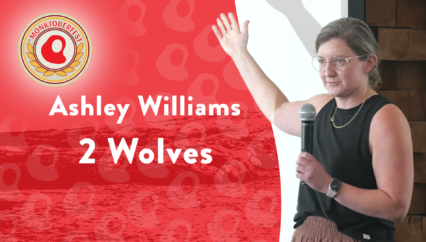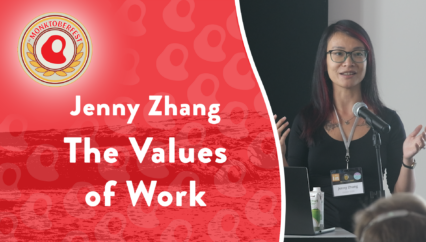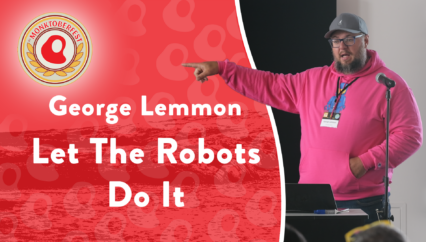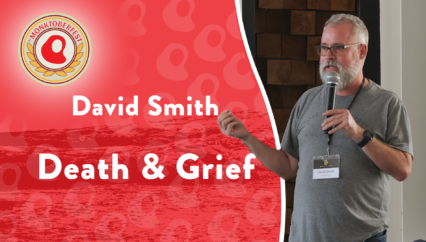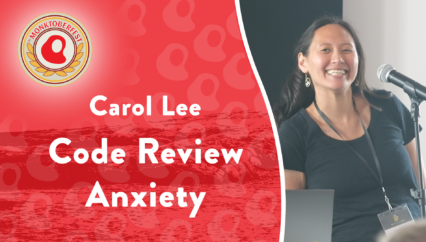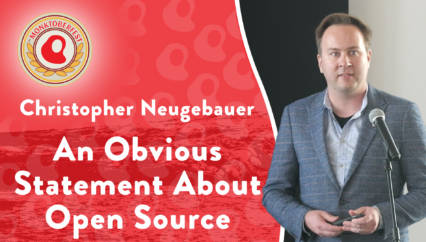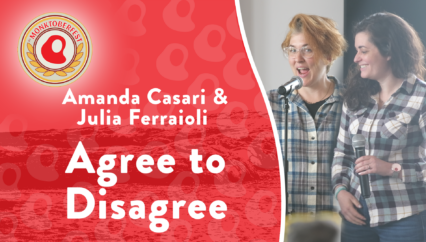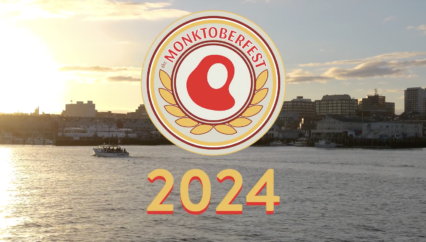A longer to this talk title would be: “Top of the Mourning to You: Saying goodbye to a company you loved because you had to, not because you wanted to.” From late 2016 to early 2020 Eamon worked at Pivotal. A software company with the most inclusive, empathetic, friendly culture he’d encountered in my career to date. Pivotal was acquired in late 2019 by the same company it was originally spun out of, the same company I (Steve O’Grady) had come to Pivotal from, and I left shortly afterward, knowing what was coming. We have all worked places we really loved for a time. This talk is a eulogy to a great culture, a mourning of what once was and what will probably never be again. Finally, this talk is a look to the future, what was learned from the experience and what he’d like to say to others who might be in a similar place.
Transcript
All right, folks, my name is Eamon Ryan and I work at Grafana labs as a senior principal field engineer. This is my first time at Monktoberfest.
[applause]
And as an natural following to that, it’s also my first time speaking at The Monktoberfest.
[applause].
So I’m the first post-Steve’s presentation, so I almost feel like I’m getting not-so-subtly hazed in the process.
But I’m very excited to be here and to share this talk with you. I had the idea for this for some time, ever since a particular event occurred which we’ll get to and I jotted down some notes in case I ever found a conference that was, like, suitable to the type of talk that I had noted down.
And of course, extremely late to the game, I learned that this conference existed earlier this year and I went, “this is the one” and so I sent it in and I talked to Steve about this on the boat last night. He literally said if it was a talk that fit anywhere else, then it shouldn’t be here. This is the place for ones that don’t fit. So perfect!
So what’s the talk about? My talk is called this: top of the mourning to you. Saying goodbye to a company you loved, because you had to, not because you wanted to. So as you can probably guess, I’m focusing on a past job here. And likely a feeling that many of you have had at some time in the past. We’ve all had jobs that we’ve left less than voluntarily and this kind of focuses on that.
So a bit of history, back in late 2016, I joined Pivotal software, you might have heard of them, they were all about extreme programming and test-driven development and pair programming and all those fun kind of agile things. They made company Concourse CI. They were the primary contributor to Cloud Foundry. They made Green Thumb, Gem Fire, all these great things. And they’re also consultancies around modernizing your applications and also implementing things like Cloud Foundry. And the last one is a team I was actually on, though it doesn’t really matter in terms of what we’re talking about here.
These are some old pictures in the offices I was able to find through the wayback machine, because the website is not in the same form anymore. You can see it’s kind of a typical tech startup in appearance. But there are some nuances here, too. So one of the things that they always did was there was always a full hot breakfast spread every morning which is nice, and you’re like, oh, that’s a cool perk and one of the subtle reasons for that is to make sure people are in there on time. Because that would be cleared away very shortly after the time that most people started work, so it was a subtle incentive. There was a lot of if you’re into agile processes in the office, so physical like standups, retros, all those fun kind of ceremonies.
Most engineers actually paired on their programming tasks, almost all of the time.
So if you were paired on a problem with somebody, you might be like, oh, that was kinda fun and like he we resolved the problem pretty quick, but imagine doing that for 6-plus hours a day, and I don’t mean this in two different computers and you kind of walk over and talk over the problem. All of the machines, it was actually one machine, two monitors, two keyboards, two mice, so you could not do things at the same time. It was impossible, and most of the engineers worked that way.
And it worked really well. It was extremely draining, but it did function like really well in terms of the output that it generated.
You were also rotate who you were paired with every week for the most part and what this did was it had the added bone of achieving very high content among the team, because everyone kept sharing their knowledge around all of the time.
And sometimes they would do things like cross-team pairs, and initially that might slow people down and I guess in some ways it did, but it brought the average up higher, so it worked really well.
Ping-pong game during breaks and I later learned that this subtly nudged you to an acknowledge that also involved pairing. So it was pleasant, but I guess a little bit subtle and insidious at times, when you realized that these were ways that made sure that people were collaborating all the time.
So that might make you ask if, you know, I was in a cult. And I can’t really fault anybody for saying that, but that’s obviously a sensationalized opinion and no one would like write an article about that or say it so dramatically.
[laughter]
It did make sense in many ways, so the original consullant group was Pivotal labs and that was around the modernization process. They were transforming how people wrote apps and transforming their processes, so having all these ceremonies helped to do that and to show people that a newer, more modern way of working,
And this then led to Pivotal Labs, started working on Cloud Foundry and all these things, so the internal engineering teams saw this worked really well and adopted all the same processes, because it did work, and that’s the whole reason it was being done, but all that wasn’t really what made Pivotal what it was.
Do the right thing.
Do what works,
And be kind kind. This was the set of company values or mantra or whatever you want to call it. Everything stemmed from this and let me tell you, people really took this to heart. So the people that worked at Pivotal were some of the most kind and empathetic people that I had ever worked with, across the board, and it wasn’t just like software engineers. We’re talking software engineers, documentation writers, everybody, operated with these three things in mind all the time.
I don’t know how we did such a great job of selecting for this in hiring, but we did.
Incidentally, on hiring specifically, engineers they actually had to do a one-hour pairing exercise, and if you were interviewing for something that wasn’t technical, it was OK, it wasn’t really about the technical task. What it was, was you being scored on being able to work together. And so being able to take correction and if you were a jerk who always had to be right, you weren’t going to pass this.
So another thing that engineers specifically had to do was an entire day of pairing in software problems. To and I think these parts of hiring really did contribute a lot to the kinds of people that did get hired. It wasn’t perfect, but it helped a lot.
We actually used to have this like sticker that you would get for your laptop, as well, it was a version of this.
So this is a personal story. So back when I first started at the Pivotal office in San Francisco, I came in and got some breakfast and sat down at one of the long tables that were there. I picked an end that was kind of empty because I didn’t know anybody within seconds I had somebody else coming over looking for somewhere to sit, who just zeroed right in on me and asked if he could sit there and I was like, sure. He asked if I was new or if I was visiting from another office or something like that and I said it was my first day.
And they jumped in like a super warm welcomings mode and told me everything they could possibly tell me about the office and working there, took me on their own personal tour around the two floors of this like warehouse building office that we were in, and now, I’d just met this person. They were not part of my onboarding in any way. They were just a stranger I met at breakfast, and I wasn’t scheduled to actually meet anybody until a little later in the day. But here this person was giving me all this care and attention, and a tour.
After it concluded, I eventually had access to like some internal systems and I knew their name so I said, oh, I’ll look up what that person does, all they did is tell me their name and I type it in and they’re like a VP and I was like, what? So a VP that was completely unrelated to my job function took a bunch of time out of their morning to take me around the office and introduce me to a whole bunch of people, just because they saw I was new and I just started that day. They didn’t have to do that or need to do that, but they chose to do that. And that was like really impactful for me for like a first day. I was confused and surprised and obviously pleasantly surprised.
And probably didn’t quite believe that that was anything more than, you know, wow, that guy was really friendly. But no, this was by no means a freak occurrence. This was exactly the kind of thing that was completely normal at Pivotal. People were really, really kind.
Some other smaller examples: A random question to a developer, if you walked up to one of their teams. They don’t have the right answer, but they will go walk and talk to another team, so you kind of walk to the next group, the two of you together, and then you walk to the next group and the next group, and you kind of have created a Pied Piper. But you do get there in the end. You might do an impromptu white-boarding session together.
I — people always made sure you were listened to in meetings. Because new people were not passed by, this never happened at pivotal. They always made sure people included them and made sure they understand what was going on.
You might get initiated into the one-minute plank, which literally a whole circuit of people in the office floor, all doing a plank at the same time and trying to see if they could go a whole minute, which is a ridiculous activity, but it was silly, and it was fun, and you could make fun of yourself, and it was a way to meet people that you wouldn’t ordinarily.
There was also a Slack channel for splitting avocados, which I thought was a bit strange, but apparently eat half avocados and not knowing what to do with the other half!
[laughter]
You could also play ping-pong with literally anyone, because it was such a popular game to play in the office, though personally I found everybody was way too good at it for me. Amusingly I searched for an image using the term tech worker ping-pong and this was the third result and what’s really funny is this is from the Pivotal San Francisco office.
We also did happen to have these big nets, as well, to catch the balls, which is how serious they were about it so they wouldn’t be flying all the way in the office on people’s desks.
And you could always speak up at the whole-floor standup that happened every morning, complete with everybody actually standing, as you can see in the picture, and an amazingly synchronized clap at the end. OK that’s clapup, and one clap, but everybody was dead on on that clap, which was a bit scary the first few times. Not a cult!
[laughter]
All this was really enveloping, pretty soon you found yourself chatting to strangers in the office and asking them the same questions you were asked. Offering to show them around if you had some spare time because you knew it was the nice thing to do.
Of course, nobody was more inviting and welcoming than the office happiness team and I know that sounds really dystopian. But really it was just a better version and far more accurate for the workplace operations team, oversaw office events, the front desk kept the place decorated for different things that were happying throughout the year and tons and tons of other tasks.
You could walk into any Pivotal office and always get the warmest welcome you ever got. And to be pleasantly unsurprised that people were equally lovely in this other place they’d never been before. I popped in some other places in other cities to see what they were like and everybody was just so-so nice every time.
So these attitudes and behaviors, they naturally bled into work. A lot of our work outside of the internal teams was consulting, so in person with customers, both in our offices and out at theirs, sometimes, and we loved getting them into all the fun things, especially when they were at ours and we could really immerse them in it. We introduced them to the same working values and they started thinking all these ceremonies were totally strange but they all came around in the end. Again, totally not a cult.
A former Pivotal colleague, this is the Nat Bennett wrote an article and I included this paragraph because I helps get this across. If you you weren’t there, the best way I can describe it is, it was a little bit like being a Star Fleet officer. You were on a mission of peace and exploration. Your coworkers all share your values, you’re kind and cooperative not because it’s the right thing to do, but because it works. You get shit done, all the time. You are proud of the work you do and you understand that in the past and in other cultures, people still believe in things like money and war, but you know you’ve found a better way and that way lets you run circles around the folks who are still stuck on zero-sum competition.
This captures it really well, I think, although I have the tainted perspective of I know it captures it well because I was there, but hopefully it helps it come across a bit better to those of you that weren’t.
But I can’t just gush about the place for 30 minutes, because that’s the point of the talk. I gave you this context, because I want to try to communicate to you, if I can, how special this place was, and why I’m still upset that it’s gone, years later.
So in April of 2018, Pivotal went public, and no, I didn’t get rich from it. I joined too late for any of that.
The stock went up, and it went down, it didn’t do great overall. It kind of mostly came back to where it was, actually a bit lower.
And in August of 2019, it was announced that VMware was going to acquire Pivotal. This was a bit strange, because Pivotal had actually been originally spun out of VMware, around 20 13, 2014, one of those, but I guess they suddenly decided they cared about applications and not just infrastructure after all, and they said, oh, you guys can come back in here the acquisition closed just before the end of 2019. It wasn’t totally clean. There was a lawsuit. Accusations of shady dealings, and people putting fingers on scales who had too much power and were influencing things happening in the background. But ultimately, it didn’t stop the deal from going through. There was a settlement reached before this went to court full on, but still, the damage was done.
Now, I in particular was knowing exactly what was going to happen, because I actually come to Pivotal from VMware, after working there for about eight years. I had seen VMware acquire many companies, and I saw how it went every time.
The usual acquisition cycle. They’ll come out and say, oh, the culture won’t change. The culture of your company is so important. There are like 60 heads shaking right now. The culture is so important. In particular, they harped on it harder for Pivotal and said, oh, that’s completely like the most important thing that we’re trying to preserve here, but of course this was a lie.
Unless you let a company operate as a totally independent entity, the culture is almost certainly going to be destroyed, in favor of the one acquiring the company.
Also, in the playbook is saying that layoffs won’t happen. Yeah. With any acquisition, there’s going to be duplicate functions, and so layoffs are most likely going to happen. The last couple of years has probably been the most layoffs we’ve seen in forever, so we all know how that goes.
On a town hall that happened before the acquisition closed, someone from Pivotal who had been chatting to folks they knew who had been working at VMware, asked about VMware’s policy of annual layoffs that happened at the beginning of the year, and I don’t remember what person from VMware responded but they had the gall of saying that VMware doesn’t do annual layoffs, which is just a straight lie, because I remembered that they would have a memo saying, today’s the day, because they axed 5% of the company and you just stopped working and this was every year for eight years. It was harder for them to do in countries with stricter labor laws, of course, but broadly it still did happen every year.
And I don’t know, I think just thought the absolute antimony of saying we don’t do layoffs. And it was something weasely like, those aren’t layoffs, those are just reductions in force. That’s the same thing, though!
Now, does this mean that VMware is an awful place to work? No, not at all. It was my first job and I had no major issues here. It was corporate, but it was fine. But again, it was corporate. And corporations are known to be pretty rigid and following their processes, so I knew what was coming. I knew that everything I had felt about Pivotal was going to be destroyed sooner or later. So I told my VP, who was a ten-year at VMware that I wasn’t going to stay that I wasn’t going to stay. He encouraged me to wait a bit and see how some stuff worked out. He was maybe wanting to make sure that — so I waited a little bit and then I watched VMware lay off that whole happiness team that I mentioned earlier. And made the cull you are too of every office the way it was, they’re like, nope, out the door? And why? Because of corporate rigidity, because of VMware’s policy of how they ran their offices is all those people were contractors for another company and they’re like, no, we have to apply the policy to everything, despite what we said before.
They could apply to be new contractors, though. Great consolation. So VMware laid this team off without a thought. After they promised to preserve company culture, not understanding that the very strong team were strong shepherds and stewards of that culture.
There was protests and there was an open letter that made the news. With hundreds of signatures from folks at Pivotal, including me, but ultimately, if didn’t change what happened, but it was a nice gesture.
Is there enough writing on the wall yet? There was for me.
I left in March of 2020, and yeah, good thing nothing else world-changing was happening at that time. Great time to leave!
[laughter]
I warned close colleagues everything that was going to come to pass, but almost all of them stayed, for various reasons. Some of them, it was kind of uncertainty, they didn’t want to leave a job when they had a job. Fair.
Or just blind hope that things wouldn’t actually change that much. Or just wanting to ride it out as long as possible for their own personal reasons.
On the boat last night, I was told the amazing phrase: Some people just want to stay on the carousel until it stops completely, which I think is very accurate here.
As the months went on, I heard that everything I had predicted had been correct.
And slowly but surely, everything that made Pivotal, Pivotal, was erased. I didn’t take any pleasure in being right. So no happiness team, they got rid of the breakfast in the morning. Lots of the offices were closed, because VMware’s office policy was mainly that they weren’t right in the big cities, they were often in a suburb or satellite city, so it was cheaper and they didn’t have the space, so offices that weren’t closed, they remodeled them all to the really boring and corporate, as you might expect. There were reorgs, technical manager roles were replaced with nontechnical manager roles, which seemed unnecessary, because these people were in the roles already.
I could go on, but you can ask me later if you want.
So I had now watched both myself and many friends go through the five stages of grief, so denial Pivotal wouldn’t sell out. Anger. I absolutely hate this, why is this happening? Bargaining, lying to yourself, depression, you’re just hoping, and acceptance, you go well, it’s dead. And it’s time to go and move on. For me, all these stages happened much faster, because I had the foresight of having worked there before, so I knew everything was going to happen, so I just rapid-fired through all of these, but I watched all the friends I had at the company go through them in slow motion, which wasn’t enjoyable, and not really an activity you want people to go through.
So people were scattered to the wind. Many wept to different companies, some went to the big ones that you know, some people went to small ones, some people left tech entirely, which was really interesting. Many people tried to go to companies that were as Pivotally as possible. So they were companies like Pivotal or they were former customers that had kept the policies and tried to keep them up. From what I can see from the alumni Slack, there was a lot of people just looking to find something similar. There was an article I found in the past that I could not find again to quote it directly, so I’m paraphrasing, but they phrased it as all of the ex Pivotal trying to chase pie to work at the same place again. And I don’t think they got it wrong. That was a really great way to describe it.
Some formed a company called mechanical orchard but it’s many much smaller and it doesn’t do the same things. There are some folks there from Pivotal there and I hope they’re doing really well. I haven’t talked to them lately.
So what do I do for fun? This is my commercial pitch — no, I’m just kidding. I’ve been here for four and a half years. So it must be better, right? Why am I so sad and angry that I who a whole talk about the company that I actually spent the least number of years working for in my career? Well, Grafana is different. I wouldn’t say it’s better or worse, it’s just different. There are so many different things that it’s hard to compare them. For one, the company’s fully remote, and was fully remote before the pandemic.
And so the dynamic is totally upended from how things were at Pivotal, and there isn’t this same in the office nature, you can only do so many things with remote tools as everybody knows by now. We all have great times when we get together, which is also enhanced by the fact that we very rarely do, so you have the whole absence thing and we get together and we have a great time, because we’re not usually together.
The values are different. Culture is different. Not bad, again, just different. And people are still kind, of course. I also lived through hyper-growth at Grafana and I saw us more than 10X or employee count since I joined, and so I’m basically a fixture on the wall at this point, or an old man in Grafana terms, and that’s just so different than joining a company like Pivotal that was already at like 2,000 employees when I joined.
I loved working at Grafana, but I also loved working at Pivotal, too, they’re not mutually exclusive, and I can still be upset about what happens at Pivotal. If Pivotal hadn’t been acquired, there is a good chance I’d still be there today. Obviously I don’t know everything and I can’t predict the whole scenario, but a pretty good chance, since I was happy there and I had no reason to look elsewhere. And I think that’s what makes a difference.
I left VMware originally because I wanted to, but I didn’t want to leave Pivotal, I had to, it was a dead end and so I think I’ll always be both angry and sad about that, and that’s OK, I guess.
I don’t really have a choice, so, you live.
And sure, I could try and go to one of the places that have more Pivots, but I liken that to going back to your home town or a game that you left a long time ago or going back to a neighborhood or city that you used to live in. It’s never the same. You can’t recapture the same magic, you can’t go home again.
So I encourage you if you find yourself in a place where you really love the team that you’re in, that you try to treasure it if you can, I have the great fortune of being on a team that I love right now, at Grafana and I really try to savor it as best I can.
Speaking of things that end, some of you may be aware that in an ironic turn of events, Broadcom then turned around and bought VMware and let me tell you, talk about a taste of their own medicine!
[laughter]
Because Broadcom absolutely gutted VMware. This is only one headline. They’ve done several rounds of these layoffs. Thousands and thousands of people. It was almost poetic, and the schadenfreude should be delicious, but I still knew a lot of people that were there, both from Pivotal and before I worked at Pivotal and they all had their lives upended because of this, and none of this brings Pivotal back, so really it doesn’t make me feel any better, other than to make jokes about it like just now. And so I’ll just hold those three shares fondly in my own memories. Memories of a great company and great culture and great people that just wanted to do the right thing, do what works, and be kind.
Thanks for listening to my eulogy.
[applause]
